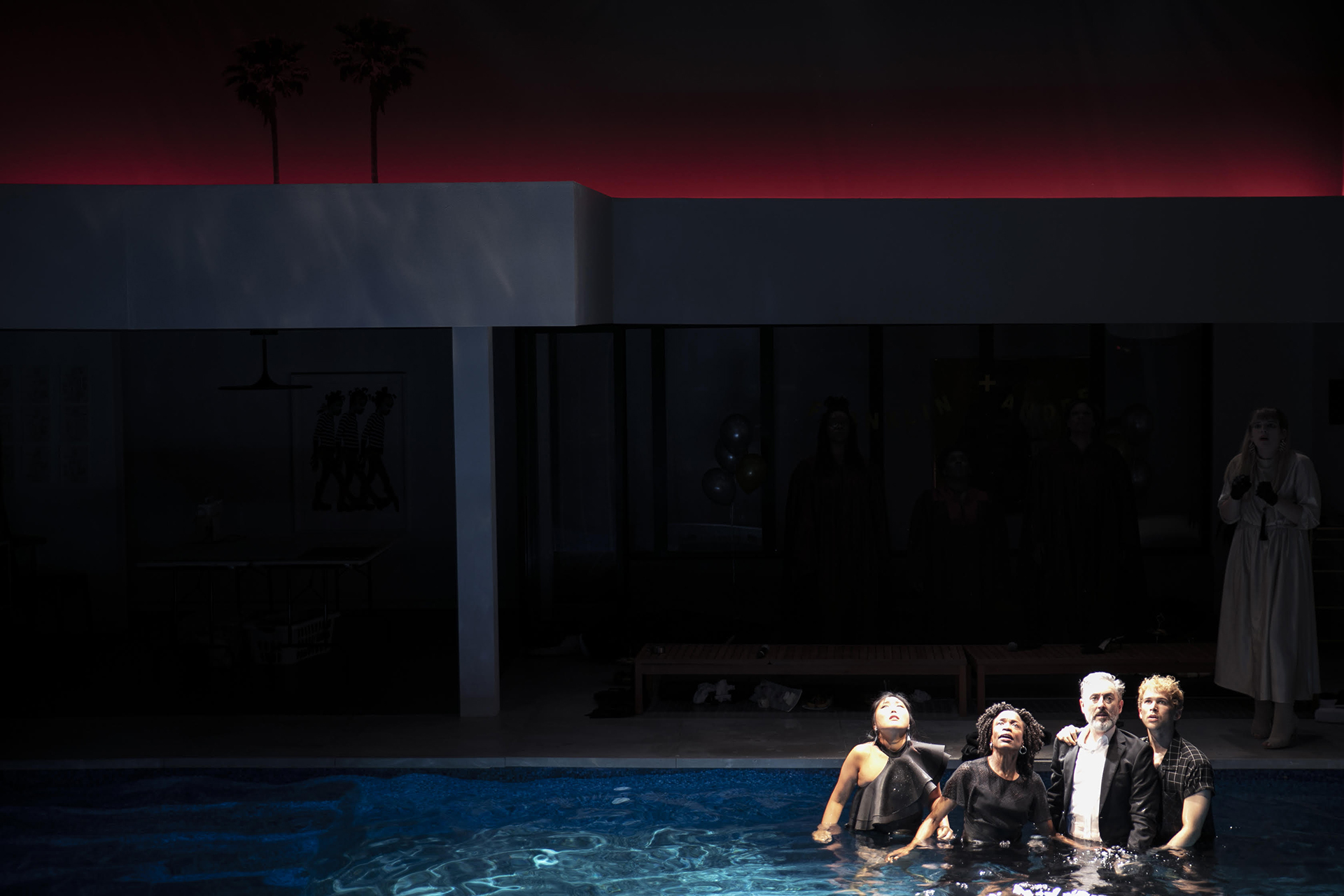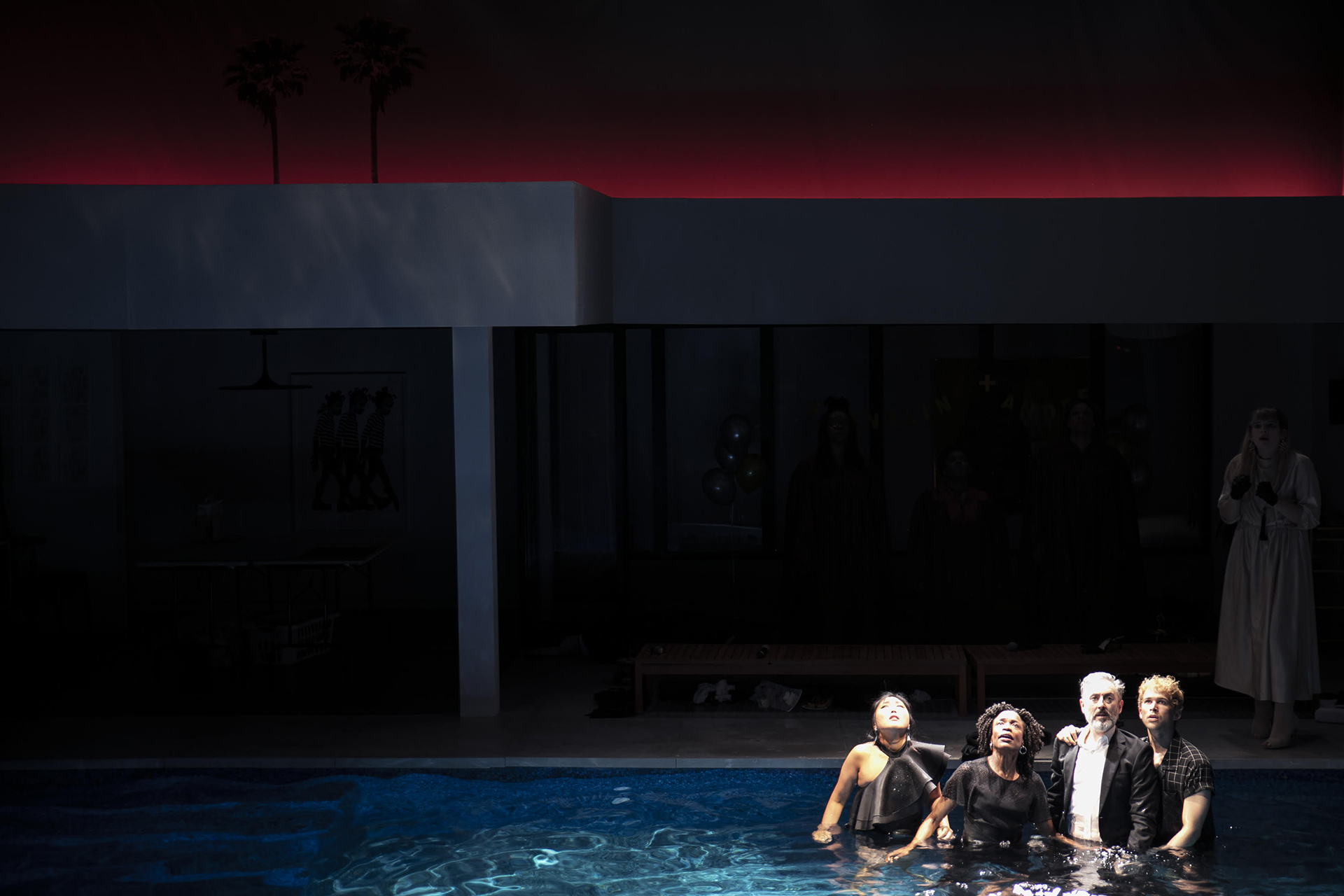Dark Relationship Explored In Melodrama ‘Daddy’


If you smell disgust and contempt in the air while viewing Jeremy O. Harris’s new play “Daddy,” subtitled “A Melodrama,” you’re still breathing.
Daddy, the inimitable Alan Cumming (Andre), is a very wealthy man who flaunts everything he has to flaunt. His art collection, described by the young African American artist he’s picked up, is “cool, like, amazing . . . or whatever. But it’s like, yeah, you have money but curatorially the taste is like, booty . . .” Franklin (Ronald Peet) observes.
Great choice of words! “Booty,” a slang expression for black ass, speaks to what matters in Franklin’s world, and at the same time to Andre’s fetishism. But, despite all their talking, they don’t share a lot of tangible information about themselves . . . who they are, where they come from, what they do.
We learn that they met at a club, and we see that things started happening very quickly after that. Andre showers Franklin with presents; they take drugs, have sex in Andre’s swimming pool, and talk about having sex, while Franklin noticeably squirms at Andre’s prurience, his spankings, and persistent aggression.
Surrounding the central couple are Franklin’s friends, the ultra-cool, air head Bellamy (Kahyun Kim), and the obnoxious, and apparently jealous, Max. As played by Tommy Dorfman, he is the most reasonable character here, as he recognizes that there is something seminally wrong with Franklin’s new relationship.
In addition, a gospel choir (Carrie Compere, Denise Manning, Onyie Nwachukwu) appears at the height of Andre’s sexual advances, and underscoring Franklin’s cries for his daddy. That these actors/singers also double as domestic help and artist assistants brings to mind Tony Kushner’s musical, “Carolyn or Change.”
The gospel singers represent an essence of African American culture in domestic and family life. That connection is clearly made when Franklin’s mother, portrayed by the beguiling Charlayne Woodward, arrives, megaphone in hand, leading the singers into Andre’s pool. It’s a riot, as if the high-priestess mom still needs to baptize her son to win his obedience. Sadly, he rebuffs Zora’s efforts to rescue him from Andre’s narcissistic, possessive, and usurious ways.
As Franklin spirals downward from a sensitive, self-questioning young artist to feeling rubbed off and lost, his art work also evolves into frightening, life-size representations of himself, Andre, and his mother. But these soft sculptures look primitive, and typical of early folk art, conceivably the work of American slaves.
Regardless, the overwhelming impression that one is left with is a scathing indictment on the way gay men live, and specifically the dyad of the older man/younger man. In spite of Montana Levi Blanco’s imaginative, upscale costumes, Andre prefers nudity.
The production, interestingly, is helmed by a gifted female director, Danya Taymor.
All of the action takes place in, and around the swimming pool outside Andre’s contemporary fortress of a home. In fact, the production values are so high end, it looks like it was produced by Netflix for the stage.
The Cake
Definitely a Hallmark play, “The Cake” lives fashionably in that zone where people-friendly, shallow social acknowledgements thrive.
In fact, it’s an adorable, entertaining confection, with a great role for Debra Jo Rupp. As a stage actress, Rupp is known for her comedic range, as she demonstrated in the one-woman show, “Becoming Dr. Ruth.” Regardless of her numerous television roles, she remains an actress better known for the characters she plays than by her own name. Still, her voice, which sounds like it’s syphoned through a tin can, and her high-pitched giggle, remain distinctive.
Here, as Southern baker Della, a pastry chef bar none, Rupp’s comedic appetite gets piqued. Bouncing up and down in her bakery, the one that barely supports itself, she’s practicing for her appearance as a contest on a television baking show. To her dismay, she loses the gig when she’s exposed for refusing to bake the cake for a same-sex marriage.
It’s actually the wedding of the little girl whom she had adored from the day she was born, and her African American girlfriend from New York City, a tell-all journalist, with a barb apparently, splendidly played by Marinda Anderson. As Jen, her bride and Della’s dear friend, Genevieve Angelson is a blushing ingenue and a nice guy.
And as Della’s husband, the one who plumbs for a living, but can’t get it up at home, Dan Daily pulls off a surprising jest. Underlying the great debate over marriage, Della and Tim face the apathy that comes after many years of living together. That we see how they change also speaks to the wonders of marriage.
Designer John Lee Beatty knows kitsch, particularly when it comes to wallpaper. Playwright Bekah Brunstetter has a fanciful way of addressing social issues. Slickly directed by Lynne Meadow.



